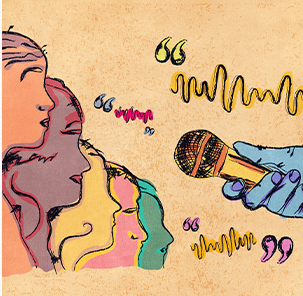Subscribe and receive the best Inkyfada podcasts straight to your mailbox.
Don't miss out! Subscribe to our newsletter to receive the latest Inkyfada podcasts.
Thanks for your inscription
Unsubscribe at any time

"I do not believe in a god who cannot dance" (Nietzsche, Thus spoke Zarathustra).
Dance is the first known artistic expression of humanity.
Why do we dance?
This is a question that resonates within the steps and the gestures of the hips - for dance is merely a text written by the body, in unconditional alignment with life. Dance is a paraphrase of both new and old stories, a reminder of fragmented memories and a depiction of reality and everyday life.
To the rhythm of the Bounouara and the Fezzani, we set off on a journey in which we explore the stories told by the bodies of women and men throughout the generations. What is Tunisian folk dance? Can it be limited to its labels and definitions?
What does this spontaneous, natural expression tell us as it weaves its narrating fabric of temporal and geographical accumulations, as well as cultural, social, economic and political introspection?
How is this dancing body - that so closely identifies with the rhythm that the two practically become one - formed? Who defines its limitations, and how do we transcend these?
Why did we dance in the past? Why do we dance today? These are the questions that this fourth episode of Tbarbich seeks to address.
Inkyfada Podcast is the first platform entirely dedicated to original Tunisian podcasts, and was conceived by Inkyfada media in collaboration with the in-house research and development laboratory, InkyLab. Inkyfada joined the global podcast boom in 2017, when the team produced the first Tunisian audio documentary, diving deep into the belly of the El Kamour struggle taking place in the desert. Since then, Inkyfada Podcast has produced a wide variety of documentaries, investigations, and podcast series, as well as articles accompanied by music; covering a multitude of contemporary issues in order to offer an immersive and alternative podcast experience. Whilst exclusively offering audio content, the Inkyfada Podcast team upholds the same core values and principles of inkyfada.com, and is committed to producing high quality content though a dynamic and meticulous production process. In addition to the permanent team, Inkyfada podcast works closely with various journalists, artists, illustrators, musicians and other content creators in order to diversify the platform and support artistic creativity. These podcasts differ from traditional radiophonic content in that the applied production and editing process is more akin to cinematographic techniques, in addition to being web-based, downloadable and accessible on demand. Additionally, Inkyfada Podcast uniquely offers subtitles in French, Arabic and English for all audio content, the majority of which is recorded in Tunisian or in the preferred language of the speaker in question.